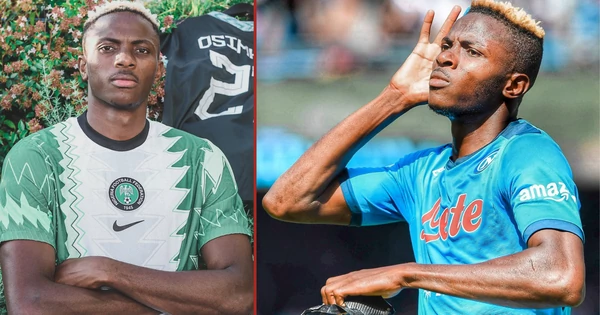The top clubs in Europe appear not to be interested in Nigerian players, a tradition that has been going on for a couple of years.
Before achieving the superstar status, every player’s dream is to win numerous trophies, play for the biggest clubs in the world and represent their country.
For Nigerian players, it should not be different. In the 1990s, the country had its best set of players, which is why it is not surprising that the period was the best for Nigerian football.
In the golden years of Nigerian football, the three-time African champions qualified for their first World Cup tournament in 1994 before losing agonizingly to eventual finalists Italy in the second round.
Before their remarkable achievement at the World Cup, they had won their second Africa Cup of Nations title earlier, beating Zambia in the final.
Two years later, the Dream Team made history by becoming the first African team to win the gold medal in the football event of the Olympics. Nigeria’s men’s U-23 team went all the way at the Atlanta 1996 Olympics to claim the gold medal in the football event.
This success was not limited to national football alone, as Nigerian clubs also had considerable success on the continent.
Shooting Stars reached the CAF Champions League final in 1996, while BCC Lions and Julius Berger won the defunct African Cup Winners’ Cup in 1990 and 1996, respectively.
But aside from the success Nigerian national team and Nigerian clubs had, the 1990s was also a period Nigerian players played for the biggest clubs in the world.
Finidi George and Kanu Nwankwo were part of the Ajax team that won the Champions League in 1995, while Sunday Oliseh played for the likes of Juventus, Ajax, and Borussia Dortmund in the late 90s and early 2000s.
READ ALSO: Super Falcons depart for Morocco, a week before AWCON opener vs South Africa
Victor Ikpeba was the Prince of Monaco, while Taribo West was one of the world’s best defenders. Celestine Babayaro played for Chelsea, Finidi was once the world’s best winger at Real Betis, while Emmanuel Amuneke played for Barcelona.
Austin Jay-Jay Okocha was the most expensive African player when he signed for PSG, while Tijani Babangida also played for Ajax.
However, after the mid-90s and early 2000s, Nigerian players have struggled to attract the attention of Europe’s top clubs.
Since 2002, only Obafemi Martins, Kanu Nwankwo, John Mikel Obi, Victor Moses, and Alex Iwobi have played at some of Europe’s traditional big clubs.
It has even gotten worse now, with only Victor Osimhen and Zaidu Sanusi currently playing in a team that could be called a big European club.
Right now, many Nigerian players play for mid-table to low-level clubs, while some play in less fancied leagues across the world.
What makes the situation worse is that some of these players are not even regulars at these clubs.
But while Nigerian players struggle to attract the attention of Europe’s top clubs, other African stars do not have the problem.
Ivory Coast, Morocco, Algeria, and Mali, for example, have a couple of their players playing for some of the top clubs in Europe.
So why do Europe’s top clubs avoid Nigerian players?
Adaptability problem
One of the issues that many Nigerian players have is that they do not fit into the system of these top clubs. Take Wilfred Ndidi, for example, who is the closest Nigerian player on a world-class level and one of the best in his position.
Ndidi joined Leicester City in January 2017, and in that time, he has gone on to become one of the best defensive midfielders in the world.













